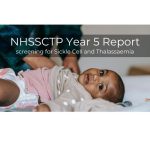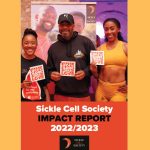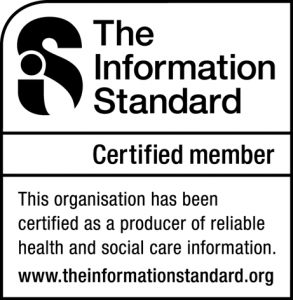This is a report on external research. It is not endorsed by the Sickle Cell Society and does not form part of our Information Standard-accredited information
In This Report
- Bodily Symptoms That Define Sickle Cell Disease
- Triggers of Crises
- Importance of Lay Beliefs
- Powerful Thoughts and Feelings
- Coping Strategies
- Other Coping Techniques
- Important Issues
The Focus Groups
In the autumn of 1998 a series of focus groups were conducted at the Brent Sickle Cell and Thalassaemia Centre. The aims of these were to:
- Involve clients with Sickle Cell Disease in the development of the CBT Self-Help programme.
- Identify relevant themes and issues about living with Sickle Cell Disease from the perspective of people living with the condition.
- Utilise relevant information for the development of the CBT Self-Help Manual.
- Raise clients’ awareness and interest in the CBT programme.
Of the clients who participated, health professionals referred some and others were contacted when they were attending their outpatient appointments or when they were inpatients in hospital. In addition, an advert was placed in the Sickle Cell Society Newsletter inviting people to attend the focus groups. Adults with Sickle Cell Disease aged over 18 years participated.
Main Themes and Issues Identified
- Physical Symptoms
- Triggers of Crises
- Thoughts and Feelings
- Coping Strategies
The Bodily Symptoms That Define Sickle Cell Disease
The common-sense beliefs about an illness can be identified by a set of attributes, and ‘identity’ is an important component. This refers to the label and symptoms that define the threat of that illness to the individual (Lau et al, 1989).
Focus group participants identified a number of bodily symptoms that many of them had regularly experienced. These included: tiredness and fatigue; being prone to infections; stiffness in joints and bones; as well as aches and pains.
It’s like someone has got inside your brains, and it doesn’t matter if you stretch, doesn’t matter if you curl up, that pain is just there..It’s a pain that you know is not going to go, it’s not going to go on it’s own. Female, HbSC.
Other symptoms that some participants had also experienced include: breathing difficulties; sleep disturbances; allergies; increases in bodily temperatures and sweating.
The individual’s representation of their sickle cell disease is important because of the impact this has on both their cognitions and their behaviour.
Many of the participants described the unpredict-able nature of the disease and the stress that this caused them. They described how they had to reduce or, in some cases, stop certain activities completely. Particularly difficult was the inability to plan ahead.
If you have anywhere to go then you’ve just got to cancel it, because you know you’ve got to stop for a while – Female, HbSC.
Triggers of Crises
Another attribute of illness representation is the ’causes’ of that illness (Baumann et al, 1989). Participants identified a number of specific triggers that they felt had brought on their crises in the past.
Extremes of temperature was one of the most commonly sited triggers, as was infection. A number of people also referred to issues of lifestyle. Although participants recognised the dangers of excessive alcohol intake, they also spoke about the desire to fit in with their friends.
You just want to be like everybody else,…you don’t want anybody to pin point out that you are different. – Female, HbSS.
Having a balanced and healthy diet, was also seen to be crucial although not always possible during periods of financial difficulty.
Many participants spoke about needing to monitor their physical activity as this was also a potential trigger of crises.
When I have a pain it just comes on suddenly, and the last time I had it was just from running for the bus – Female, HbSS.
In addition, tiredness and different forms of stress were felt to cause painful crises.
Yeah, depression…causes a crisis. And sometimes there comes with the stress, like worries, and it’s a vicious cycle – Female, HbSC.
The Importance of Lay-Beliefs
The representation of sickle cell disease by the individual patient is important to our understanding, as are the coping strategies they subsequently utilise. The representations help the individual set the target for coping, whilst the specific coping strategies employed to reach that target are selected from a given repertoire of coping procedures and are based on the person’s initial representations about the disease (Leventhal and Benyami, 1997).
During the focus groups individuals spoke about the powerful thoughts and feelings they had experienced over the years as a direct result of living with sickle cell disease. Whilst some individuals were determined to over come the disease and fight it, they nevertheless spoke about distressing feelings that they had had in the past and still experienced when they were feeling more vulnerable. Others felt less able to challenge their negative thoughts and feelings and thus felt they were less well able to cope.
Powerful Thoughts and Feelings
The feelings that the participants expressed ranged from those of anger to feelings of fear and anxiety.
Anger
Many individuals expressed anger about having the condition, seeing it as “a punishment” and questioning”why me?” Others expressed anger at “forever being in hospital or just forever being sick or some infection or something. I’ve thought ‘why me?’ when I’m in pain, when I can’t stop it.” “It’s like going downhill, I don’t know, like a step nearer to your death” – Female, HbSS.
Fear
The fear of further pain and the possibility of deterioration was on a number of participants’ minds. “The last time I had it (pain)…it was last month. After that pain it was like I had this real fear in my head and I just kept remembering the pain that I went through. And I think, to a degree, it was the same as going through it. Just the memory of it was the same as going through it..” – Female, HbSS. Individuals also spoke about the fear of rejection and of loosing a potential partner if they told them about their condition. As one female with HbSC put it: “It was like, should I? Shouldn’t I? ‘Cause you’re thinking to yourself if I tell them they’re going to run a mile. Because it’s a case of like, in this day and age, no body wanting someone that’s ill because they can’t do this and they can’t …a fear. Yeah, it’s comes under fear. Who do you tell? Or when do you tell a person? You know!”
Anxiety
Anxiety regarding what might happen during a crisis and the uncertainty about this.”Every time you have a crisis it is a little bit different from the last one.” Female, HbSS. A number of participants were also unsure of what to expect and expressed anxiety and concern about the future. “What I tend to do now when I go to the clinic is looking around and see, see what I could..(have in the future).”
Frustration
The constraints that the disease places on individuals’ lives and activities was raised by participants.”To know that you can’t do certain things, alone, is stressful” – Female, HbSS. “..You know that when you’re well you can do things and when you’re not well it’s like you have to rely on people…If you can’t do anything physically for yourself that’s depressing anyway.Do you think I like to see my sister helping out all the time? And I’m older than her! ”
Ambivalence
Certain participants expressed mixed emotions regarding their condition. For example, one female with HbSS stated that “I still think there’s a lot I need to know about my sickle cell.” A few moments later the same person remarked that “I don’t really want to know more ’cause there’s nothing more to know basically. Nothing more I would like to know, like I said, (except) from knowing a cure. It’s too stressful!” Thus a number of individuals expressed a reluctance to think about their sickle cell disease when they were feeling well.
Coping Strategies
Coping refers to a set of responses that individuals mobilise to deal with symptoms.
Passive Withdrawal
Some individuals we spoke to felt that they did not cope at all well with their sickle cell disease. One young female with HbSS commented that “I can’t! I don’t! I don’t at all. It’s really bad. That’s why I’m seeing you.”
Active Participation
Other individuals felt better able to cope and referred to a variety of strategies. Approaches that were frequently referred to included: having a good intake of fluids; keeping warm and applying heat and massage to areas of the body that are in pain; and taking medication and pain relief tablets.
A number of patients said they liked to rest and remain quiet whilst waiting for the pain relief medication to take effect. Sometimes they preferred to be on their own, and at other times having support from others was important. Most individuals expressed a desire to be able to remain at home and cope with the crisis there. Those with support from family, friends or their local GP were better able to do this.
Other Coping Techniques
Apart from the practical, medical adherence approach, a number of clients spoke of other emotion focused strategies that they found helpful in coping with sickle cell disease.
Religious Coping
Some clients spoke about the importance of religion in dealing with their condition. One female with HbSS said that “..Now I’m a Christian whereas before I was not, so that has definitely helped me to cope with sickle cell. There isn’t so much of a worry ’cause, alright, yes I’m going through a crisis or what ever, but I’m still, sometimes my faith is stronger and it helps me…I mean I’m sure we’ve all prayed when we’re sick and in pain, but I don’t just do it now when I’m in pain. Because before I use to when I was in pain, I use to cry for ‘God! Help!’ But now I pray daily anyway…I pray many times throughout the day.”
Other clients spoke about the importance of having a goal in life and focusing on that. Some spoke of career ambitions or other activities that fulfilled them. A number also spoke about the importance of supporting their children. “I’m going to be strong for myself because I have children and they need me” one female with HbSC said. This feeling was echoed by others as well.
Humour
The importance of happiness and laughter as coping mechanisms was underlined by some. One woman said that “I’m happy and bubbly as much as possible and I find that helps.” Later she added “I laugh a lot. But I suppose if you could really take away that laughter you’d see a hell of a lot, well I can’t explain and I probably wouldn’t even try to explain, but that’s the way I find I cope.”
Other Important Issues
Focus group participants also raised a number of other issues that have an important impact on their ability to cope and live with their sickle cell disease.
Employment
Fore most among individual’s concerns was the issue of employment. Individuals felt that employment was important in order to be able to support oneself but also to feel that one is contributing to society. One female participant said that “At least you know you’re contributing something, you know, you can do something. Sometimes you feel you can’t do anything, you know what I mean! ..It’s like, what can you do? You can’t get a job or if you do get a job, you know, how long are you going to be…you’re just praying ‘please don’t let me be sick, you know. I want to stay in this job, I like the job.” Some people were unable to cope with their increasing/changing levels of disability as a result of complications from sickle cell disease. Increasing levels of disability meant that they no longer had appropriate skills to apply for or maintain jobs that they once use to do. One 33 year old man with HbSS said “I got sickle in my eyes, this eye’s (pointing) the worse eye. I’ve got hardly any vision in it at all. So I had to leave (my job) because I couldn’t take it!..Since then I’ve just been on incapacity benefit. I just can’t do anything at all. I can’t see as I use to. I’m not as agile I use to be. I don’t know what kind of work I can do.”
Finance
Participants also spoke about ensuing financial difficulties as a result of their employment difficulties. This impinged on their ability to adequately take care of themselves in terms of healthy eating, and some spoke of the financial burden of paying for prescriptions that are necessary for coping with their sickle cell disease.
Housing
Inappropriate housing was another issue for a number of clients who spoke of, for example, being placed on the top floor of blocks of flats and as one man put it “when the lift breaks down I have to walk up the stairs and certain times I just can’t, I just can’t face it!”
Home Help & Support
Many participants spoke of their desire to be able to be assisted in managing their pain at home where they felt most comfortable and in being better supported in the community once they have been discharged from hospital. They expressed frustration at the lack of knowledge of some hospital staff with regard to sickle cell disease. One woman with HbSS said “that’s when I get angry as well! ‘Cause you could be in a hospital in pain or you could go in there into casualty, and they don’t know about sickle cell.” Participants also expressed a wish to have procedures better explained to them. Mixed ages and conditions on the same ward was something that the younger participants found particularly difficult after having been used to the paediatric wards they’d been admitted to in the past. One young female participant said “I’d rather die in my bed than go to Hospital.”
For a copy of this report, please contact Christina Fotopoulos:
Brent Sickle Cell & Thalassaemia Centre Tel: 020 8961 9005









